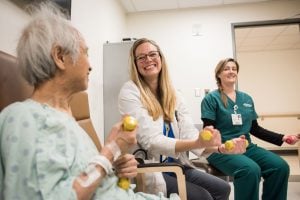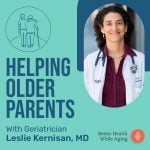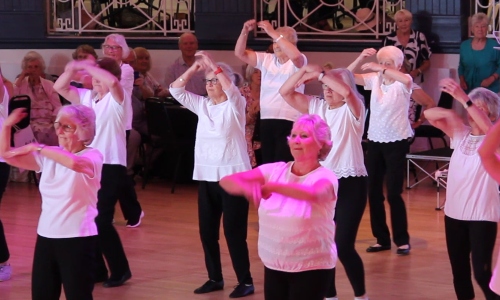

As you may know, hospitalization is actually somewhat risky for older adults.
This is sometimes surprising to older adults and families. After all, hospitals are supposed to be places where people who are ill or injured can get the medical supervision and services that they need, to recover and be restored to health.
Well, it’s certainly true that hospitalization is often the only way for a person to obtain more substantial care from nurses and doctors. (There actually is an alternative called Hospital at Home, but it’s not widely available.)
If you’ve broken a hip, or have developed really significant shortness of breath from pneumonia, or otherwise are too unwell to be safely treated in the outpatient setting, hospitalization is often necessary. And since aging increases one’s vulnerability to a variety of health problems, older adults get hospitalized at higher rates than younger people do.
The problem, however, is that although hospitalization is intended to help patients, we’ve also realized that it tends to stress the body and mind in many ways. This is hard on every patient, but especially affects older adults. For instance:
- Most people find it hard to sleep well in hospitals, in part because they are noisy and also staff may come in to check blood pressure, or draw blood during the night or early morning. This means many patients are sleep-deprived, which can interfere with convalescing, or worse yet, provoke delirium.
- Delirium is very common in hospitalized older adults. This state of “worse than usual” mental function is very common after surgery, but also can be brought on due to the stress of medical illness and other factors. (Learn more here: Hospital Delirium.)
- Lying in bed means that all patients start to lose strength. As one ages, this loss of strength and mobility happens even faster. So, many older adults can experience significant losses in strength and mobility during a hospital stay.
It’s no secret within healthcare that hospitalization is risky for older adults, and we’ve actually understood the reasons why for quite some time.
But until recently, hospitals didn’t seem to have the right incentives and support in making needed changes.
Fortunately, that is now changing, with the growth of the Age-Friendly Health Systems movement.
Creating Age-Friendly Hospital Programs
In a recent podcast episode, I interviewed UCSF geriatrician Dr. Stephanie Rogers, who has been applying the principles of Age-Friendly Health systems to create new inpatient geriatrics programs at UCSF Hospital.
Specifically, over the past few years, Dr. Rogers and her colleagues have launched:
- An Acute Care for Elders Unit
- This is a special hospital ward, designed to help older adults avoid many common complications of hospitalization, such as loss of mobility, loss of independence, falls, malnutrition, delirium, risky medications.
- A Hip-Fracture Co-Management Service
- Experts in geriatrics and orthopedics created a “best-practices” pathway for hip fracture, which is designed to minimize hospital risks and maximize the older person’s chance of returning to function. (Such “best-practices pathways” are important, because otherwise healthcare tends to be variable and it’s common for patients to not get whatever care is currently recommended as optimal.)
- Every patient admitted with a hip fracture now gets seen by a geriatrician working in partnership with the orthopedics team.
- A Delirium Reduction Campaign
- UCSF is now screening all patients for delirium, and has trained staff in prevention and management.
All three of these programs are fantastic and are making UCSF’s hospital care much better and safer for older adults.
To learn more about them, and about Age-Friendly Health Systems, I highly recommend listening to the podcast interview with Dr. Rogers:
086 – Interview: Creating Age-Friendly Health Systems at UCSF
You can also download a transcript of the interview here:
Transcript: Creating Age-Friendly Health Systems at UCSF
Why Everyone Should Learn About UCSF’s New Age-Friendly Programs
If you don’t live in the Bay Area, do you need to know about these new programs at UCSF?
Yes! Here’s why.
First of all, whether similar programs are available at your hospital or not, it’s always a good idea to learn more about the risks of hospitalization in aging, and how they can be countered.
Far too many older adults and families are blindsided by common problems related to hospitalization, such as delirium or loss of strength and independence.
I don’t want people to be overly anxious about the risks of hospitalizations, but I do think it’s important to be informed, as this enables people to consider being proactive.
Next, if you want your local hospital to become more “age-friendly”, it will help if they hear that from you!
So if you’re an older adult, or concerned about an older relative, or in any way interested in how we can make healthcare better for older adults, I hope you’ll take advantage of the recent podcast episode.
The sooner we all learn more about Age-Friendly Health Systems, the sooner we’ll reach a point at which getting better and safer care becomes the norm for older adults, rather than the exception.
086 – Interview: Creating Age-Friendly Health Systems at UCSF
Transcript: Creating Age-Friendly Health Systems at UCSF
Questions about better and safer hospital care for older adults? Or about Age-Friendly Health Systems? Post them below!




